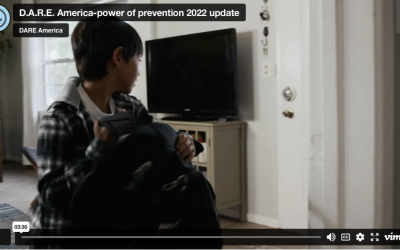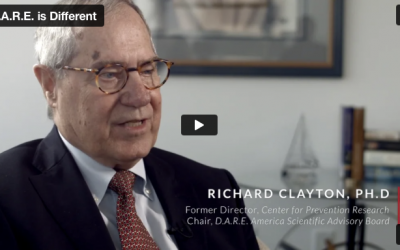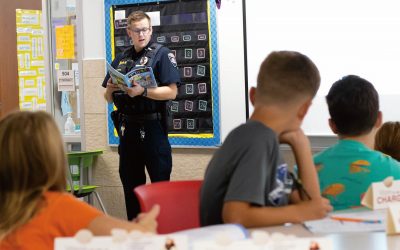
Navigating teen life while confronted with current issues like vaping, teen suicide, social media bullying, and illicit drugs, including today’s opioid epidemic, mean young people today must make critical choices at an early age.
The hopeful news is communities that work together can make a big difference in the lives of children and young adults.
For 36 years, D.A.R.E. has been committed to helping young people make good decisions that support a safe and healthy life, and we’ve learned a few things about effective prevention through partnering with schools, families, and law enforcement in communities across the United States and the world.
Today, communities can implement prevention programming that is more effective than ever, with decades of scientific evidence guiding the way. Here are three big ideas that are supported by research:
- Effective prevention programs are community-wide, with consistent messaging about risk behavior appearing in more than one setting. For example, school-based prevention programming that is reinforced by family talks at home or a city-wide social norms campaign. Community programming should address issues highly relevant to the local area. Families can boost this effect by encouraging conversation about risk behaviors at home. It helps when many community members are involved in shaping teens’ thoughts about challenging issues — especially when they offer an opportunity to see things in new ways. Pacific Grove (Calif.) Police Department school resource officer Justin Hankes sees this happen almost every day at the schools he serves. He says “getting the chance to connect with students and teachers in the classroom provides each of us with a broader understanding of the other’s perspective — we live in the same community and want to live happy and healthy lives. My job allows me to connect with kids in my community to foster leadership and a culture of safety and care.”
- Another thing to look for is long-term prevention programming. Although speakers or school assemblies may provide information or a motivational boost, they are most effective when they supplement an effective program that connects with kids at multiple ages or grade levels, with repeated contacts over time. It takes time to build the skills needed to avoid risk with good decisions. To maximize success, it’s critical for kids to practice these skills when they are young. It’s equally important that teens continue to be engaged in prevention activities at the ages when they will start to be faced with new challenges, in order to effectively apply these skills in real-life scenarios.
- Good prevention programs for elementary-age children are based in social-emotional learning — teaching kids the skills they need to understand and communicate how they are feeling, exercise control over their bodies and minds, and to interact with others. As children transition into middle and high school, programs should continue to focus on peer relationships and social competence at a more complex level. Programs should help teens develop the knowledge and experience to make decisions that align with their own values and goals, and the skills to effectively and confidently express their choices, even under pressure.
By Ashley Frazier, Ph.D., Director of Curriculum and Training, D.A.R.E. America
Thank you for your support! Our Fundraiser has completed: Team up with Little Caesars and D.A.R.E. to Keep Kids Safe
The fundraiser has completed, thank you for your support.
President and CEO of D.A.R.E. speaks to Dr. Ted Bender about relentless efforts to help end drug issues on an international level!
Watch the podcast…
4,500 Students Graduate from D.A.R.E. Mexico in Tijuana
Tijuana, Baja California, February 23, 2023 – More than 4,500 preschool, Elementary, and Middle school students from 43 schools in Tijuana, Mexico, graduated from the D.A.R.E. program. Students completed their preventive education program against drug use courses…
D.A.R.E. Graduation at Paulding Elementary School
D.A.R.E. program in Paulding County is going strong with a new Deputy at the helm, Deputy Rich Phelan. In January he completed the 12 week coursework with the Antwerp Elementary 5th graders. This past week, he graduated the 5th grade class of Paulding Elementary….
Lafayette County’s D.A.R.E. Program Graduates 225 Students
Lafayette’s D.A.R.E. program graduated 225 students recently. The D.A.R.E. program taught by Lafayette County deputies is a 10-week course that focuses on how students can make responsible decisions when it comes to drugs, alcohol, tobacco, bullying and peer pressure.
Support D.A.R.E. and enter for a chance to win!
D.A.R.E. curricula provide students the knowledge and skills to make good decisions for safe and healthy living. D.A.R.E.'s keepin' it REAL elementary and middle-school curricula are based on Socio-Emotional Learning Theory which identifies basic skills and processes...
The Power of Prevention | D.A.R.E. Video
D.A.R.E. is Different | Richard Clayton PhD
A Different Kind of D.A.R.E.
The principle is still the same: Friendly officers from the Moorhead Police Department come to fifth grade classrooms every day to prepare kids to make good decisions. But if you attended elementary school in the 1980s and 1990s, when the nationwide program was in its...
Copyright © 2022 D.A.R.E. America. All Rights Reserved.
Copyright © 2022 D.A.R.E. America.
All Rights Reserved.












